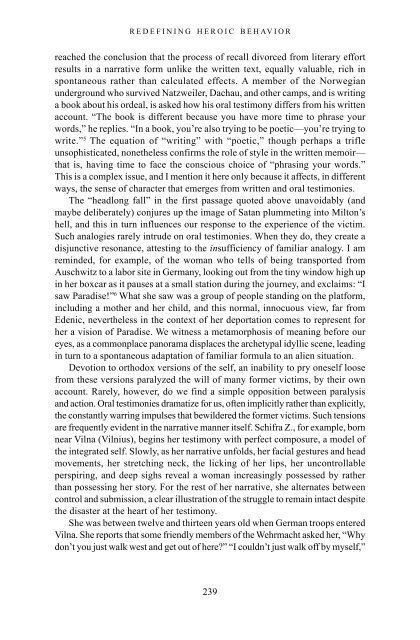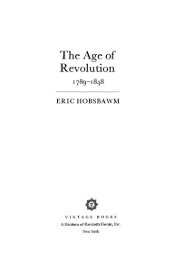The_Holokaust_-_origins,_implementation,_aftermath
The_Holokaust_-_origins,_implementation,_aftermath
The_Holokaust_-_origins,_implementation,_aftermath
Create successful ePaper yourself
Turn your PDF publications into a flip-book with our unique Google optimized e-Paper software.
REDEFINING HEROIC BEHAVIOR<br />
reached the conclusion that the process of recall divorced from literary effort<br />
results in a narrative form unlike the written text, equally valuable, rich in<br />
spontaneous rather than calculated effects. A member of the Norwegian<br />
underground who survived Natzweiler, Dachau, and other camps, and is writing<br />
a book about his ordeal, is asked how his oral testimony differs from his written<br />
account. “<strong>The</strong> book is different because you have more time to phrase your<br />
words,” he replies. “In a book, you’re also trying to be poetic—you’re trying to<br />
write.” 5 <strong>The</strong> equation of “writing” with “poetic,” though perhaps a trifle<br />
unsophisticated, nonetheless confirms the role of style in the written memoir—<br />
that is, having time to face the conscious choice of “phrasing your words.”<br />
This is a complex issue, and I mention it here only because it affects, in different<br />
ways, the sense of character that emerges from written and oral testimonies.<br />
<strong>The</strong> “headlong fall” in the first passage quoted above unavoidably (and<br />
maybe deliberately) conjures up the image of Satan plummeting into Milton’s<br />
hell, and this in turn influences our response to the experience of the victim.<br />
Such analogies rarely intrude on oral testimonies. When they do, they create a<br />
disjunctive resonance, attesting to the insufficiency of familiar analogy. I am<br />
reminded, for example, of the woman who tells of being transported from<br />
Auschwitz to a labor site in Germany, looking out from the tiny window high up<br />
in her boxcar as it pauses at a small station during the journey, and exclaims: “I<br />
saw Paradise!” 6 What she saw was a group of people standing on the platform,<br />
including a mother and her child, and this normal, innocuous view, far from<br />
Edenic, nevertheless in the context of her deportation comes to represent for<br />
her a vision of Paradise. We witness a metamorphosis of meaning before our<br />
eyes, as a commonplace panorama displaces the archetypal idyllic scene, leading<br />
in turn to a spontaneous adaptation of familiar formula to an alien situation.<br />
Devotion to orthodox versions of the self, an inability to pry oneself loose<br />
from these versions paralyzed the will of many former victims, by their own<br />
account. Rarely, however, do we find a simple opposition between paralysis<br />
and action. Oral testimonies dramatize for us, often implicitly rather than explicitly,<br />
the constantly warring impulses that bewildered the former victims. Such tensions<br />
are frequently evident in the narrative manner itself. Schifra Z., for example, born<br />
near Vilna (Vilnius), begins her testimony with perfect composure, a model of<br />
the integrated self. Slowly, as her narrative unfolds, her facial gestures and head<br />
movements, her stretching neck, the licking of her lips, her uncontrollable<br />
perspiring, and deep sighs reveal a woman increasingly possessed by rather<br />
than possessing her story. For the rest of her narrative, she alternates between<br />
control and submission, a clear illustration of the struggle to remain intact despite<br />
the disaster at the heart of her testimony.<br />
She was between twelve and thirteen years old when German troops entered<br />
Vilna. She reports that some friendly members of the Wehrmacht asked her, “Why<br />
don’t you just walk west and get out of here” “I couldn’t just walk off by myself,”<br />
239



